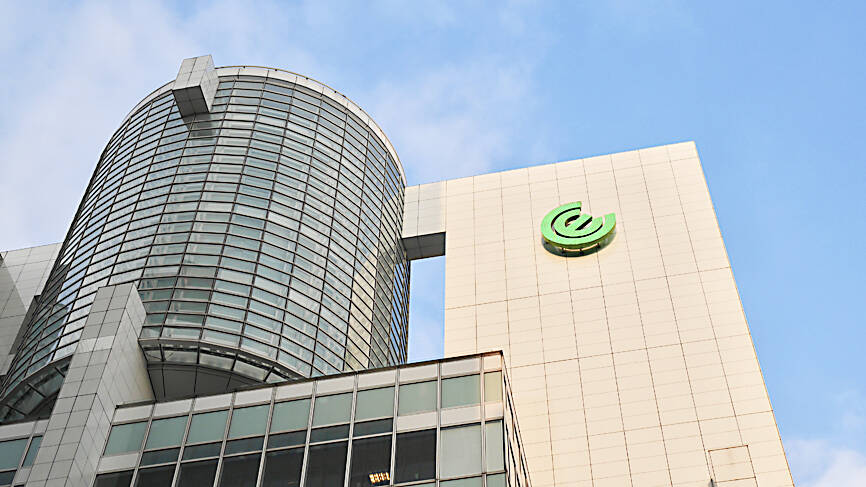Compal Electronics Inc (仁寶), the world’s second-biggest contract notebook computer maker, yesterday said that its net profit surged 50 percent quarter-on-quarter to NT$2.09 billion (US$65.73 million) last quarter, benefiting from a rebound in PC demand and rush orders for Chromebooks ahead of license fee hikes by Google’s parent company, Alphabet Inc.
That compared with first-quarter net profit of NT$1.39 billion. On an annual basis, net profit rose 4 percent from NT$2.02 billion.
Earnings per share rose to NT$0.48 last quarter from NT$0.32 in the first quarter and NT$0.46 in the second quarter last year.

Photo: Fang Wei-chieh, Taipei Times
Operating margin improved to 1.13 percent last quarter from 1.08 percent in the first quarter and 0.74 percent in the second quarter last year.
“We have received numerous rush orders during the second quarter,” Compal president Martin Wong (翁宗斌) told an online investors’ conference. “PC channel inventory has returned to normal levels.“
“We see recovery looming in the third and fourth quarters, aided by improving inflationary pressure and easing interest rate hikes by the US,” Wong said.
However, as customers have turned conservative about placing orders, Compal said there was caution about the outlook for the third and fourth quarters.
For this quarter, shipments of notebook computers should grow at a single-digit percentage from 8.7 million units last quarter due to a higher comparison base last quarter, Wong said.
For the whole year, notebook computer shipments would shrink between 10 and 15 percent compared with last year, he said.
However, Compal is optimistic about next year’s business, expecting the PC industry to embrace new replacement demand.
After holding back on spending for the past three years during the COVID-19 pandemic, corporations would be more willing to spend on PC and information system upgrades given an improving world economy, Wong said.
“The industry’s winter should be approaching its end this year,” he said. “We are more optimistic about next year and the year after.”
“Besides, the introduction of artificial intelligence [AI]-enabled notebook computers will help spur some demand,” he added.
Investors yesterday focused on Compal’s diversification to server business.
Compal is rapidly expanding into servers following in the steps of local rivals.
It expects revenue contribution from servers next year would rise from 2 or 3 percent this year.
“We have made some progress by gaining more customers from Europe this year,” Wong said. “Next year, we are expanding our reach to the US market.”
On top of that, shipments of AI-enabled servers are to increase significantly to make up 20 to 25 percent of the company’s total server shipments next year, from 8 percent this year, the firm said.
Compal is also broadening its business scope to include healthcare devices and automotive components.
It is targeting a boost in revenue contribution from the new business areas to 10 percent within three years from 5 percent this year, it said.

To many, Tatu City on the outskirts of Nairobi looks like a success. The first city entirely built by a private company to be operational in east Africa, with about 25,000 people living and working there, it accounts for about two-thirds of all foreign investment in Kenya. Its low-tax status has attracted more than 100 businesses including Heineken, coffee brand Dormans, and the biggest call-center and cold-chain transport firms in the region. However, to some local politicians, Tatu City has looked more like a target for extortion. A parade of governors have demanded land worth millions of dollars in exchange

Hong Kong authorities ramped up sales of the local dollar as the greenback’s slide threatened the foreign-exchange peg. The Hong Kong Monetary Authority (HKMA) sold a record HK$60.5 billion (US$7.8 billion) of the city’s currency, according to an alert sent on its Bloomberg page yesterday in Asia, after it tested the upper end of its trading band. That added to the HK$56.1 billion of sales versus the greenback since Friday. The rapid intervention signals efforts from the city’s authorities to limit the local currency’s moves within its HK$7.75 to HK$7.85 per US dollar trading band. Heavy sales of the local dollar by

Taiwan Semiconductor Manufacturing Co’s (TSMC, 台積電) revenue jumped 48 percent last month, underscoring how electronics firms scrambled to acquire essential components before global tariffs took effect. The main chipmaker for Apple Inc and Nvidia Corp reported monthly sales of NT$349.6 billion (US$11.6 billion). That compares with the average analysts’ estimate for a 38 percent rise in second-quarter revenue. US President Donald Trump’s trade war is prompting economists to retool GDP forecasts worldwide, casting doubt over the outlook for everything from iPhone demand to computing and datacenter construction. However, TSMC — a barometer for global tech spending given its central role in the

An Indonesian animated movie is smashing regional box office records and could be set for wider success as it prepares to open beyond the Southeast Asian archipelago’s silver screens. Jumbo — a film based on the adventures of main character, Don, a large orphaned Indonesian boy facing bullying at school — last month became the highest-grossing Southeast Asian animated film, raking in more than US$8 million. Released at the end of March to coincide with the Eid holidays after the Islamic fasting month of Ramadan, the movie has hit 8 million ticket sales, the third-highest in Indonesian cinema history, Film